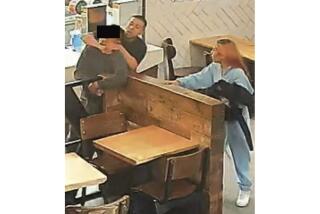Man’s Death in Alcohol Treatment Investigated
- Share via
NORTH HOLLYWOOD — Los Angeles police are investigating the death of a man who was allegedly tied up and force-fed alcohol, apparently in an “aversion therapy” program meant to kill his desire to drink, authorities said Tuesday.
Enrique Bravo, 34, died May 25 during treatment at Grupo Liberacion y Fortaleza on Lankershim Boulevard, authorities said.
Four men have been arrested on suspicion of manslaughter and false imprisonment in connection with Bravo’s death, said Deputy Dist. Atty. Craig Renetzky.
He said Bravo was restrained in a room with another man who went through the same treatment and survived. The patients were not medically supervised, he said.
“My basic understanding of the case is that these defendants were not letting these guys leave and were feeding them nothing but alcohol. The idea was that the guy would later hate alcohol so much he wouldn’t drink anymore,” Renetzky said.
“But the guy died. What he died of is unclear at this point.”
Renetzky said the suspects were either workers or volunteers, some of whom had themselves been through the program.
Alberto Saguache, 38, was arrested May 29 and charged with involuntary manslaughter. He is being held in lieu of $70,000 bail.
The identities of the other defendants were not immediately available.
Authorities said the clinic was operating without a license.
On Tuesday evening, the clinic’s doors were locked and the office space appeared deserted. A sign said the facility was temporarily closed due to a death.
Drug and alcohol counselors at licensed facilities were critical of the methods allegedly used to treat Bravo.
“It’s absolutely insane,” said Al Senella, who has run the Tarzana Treatment Center for 25 years. “It’s simply not an effective means to deal with the problem, and I don’t know of anyone who would think that it is.”
In the 1980s, the so-called Schick Method used negative reinforcement to teach the subconscious mind to dislike an addictive drug. Patients were confronted with whatever substance they were addicted to, while small electric shocks and drugs that induced nausea were administered.
One volunteer at an Alcoholics Anonymous facility in Van Nuys said she did not understand how either method of treatment could be successful--especially that allegedly given to Bravo.
“I think it’s awful,” said the woman, 30, who has been sober for five years and is forbidden by Alcoholics Anonymous policy from identifying herself to the media.
“It’s the total opposite of everything I went through,” she said. “The thing is not to drink, not to drink at all.”
Times staff writer Sharon Bernstein contributed to this report.
More to Read
Sign up for Essential California
The most important California stories and recommendations in your inbox every morning.
You may occasionally receive promotional content from the Los Angeles Times.














